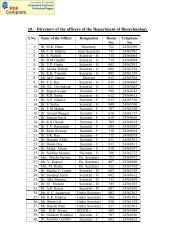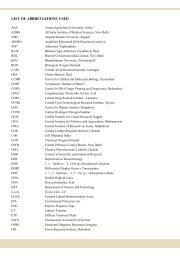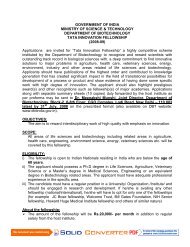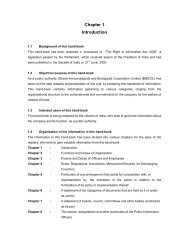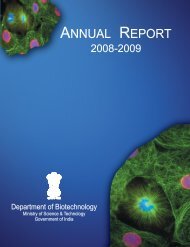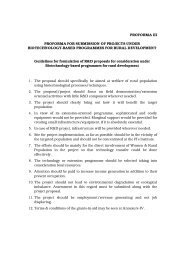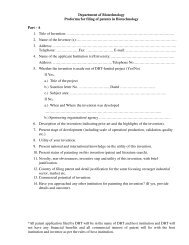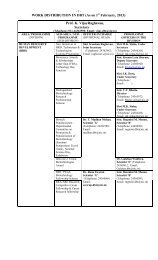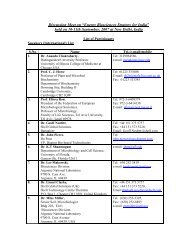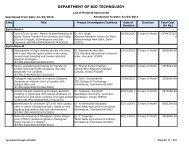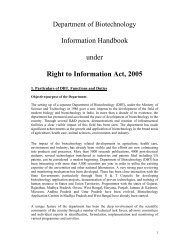ANNUAL REPORT - Department of Biotechnology
ANNUAL REPORT - Department of Biotechnology
ANNUAL REPORT - Department of Biotechnology
You also want an ePaper? Increase the reach of your titles
YUMPU automatically turns print PDFs into web optimized ePapers that Google loves.
Poultry and Livestock Farming<br />
In an attempt to strengthen livestock industry through<br />
biotechnology, projects were supported for improved<br />
production and productivity for cattle a project was<br />
supported to Veterinary College & Research<br />
Institute, Namakkal. A total <strong>of</strong> 200 women from 10<br />
villages were trained in detection <strong>of</strong> mastitis and their<br />
control, low cost feed for better milk yield in cattle.<br />
Interested women were also trained in preparation <strong>of</strong><br />
anti helminthic mineral blocks for sheep and goats.<br />
These women are earning good amount through the<br />
sale <strong>of</strong> these mineral blocks @ Rs. 35/- each. Also<br />
training was provided to selected women in<br />
entrepreneurship through poultry farming including<br />
low cost hatchery, feed and disease aspect. In order<br />
to strengthen the animal feed sector through protein<br />
and vitamin rich azolla, a project was supported to<br />
an NGO at NARDEP, Vivekananda Kendra,<br />
Kanyakumari. Under this project 1000 women were<br />
trained in low cost technology for azolla production<br />
and its application as supplement animal feed. The<br />
project had shown significant improvement in<br />
production & productivity in poultry & cattle. Over<br />
1000 women from Mutharasanallur, Pirattiyur,<br />
Nachikurichi, Maruthanddakurichi and Melavaaladi<br />
villages <strong>of</strong> Tiruchirapally were trained on desi<br />
chicken rearing and incubation using custimised<br />
hatchery unit. Out <strong>of</strong> these 100 women have set up a<br />
small poultry farm and are earning Rs. 35,000/- per<br />
annum.<br />
Aquaculture<br />
Through College <strong>of</strong> Fisheries, Mangalore, a<br />
dedicated demonstration facility has been installed<br />
at Bengre village having 16 racks with the capacity <strong>of</strong><br />
20 kg fish each and dry fish storage cabinets.<br />
Approximately 140 women were trained in various<br />
activities for maintaining a fish village by these<br />
fisherwomen. About 40 women were trained in<br />
hygienic fish drying and packaging, 37 women in<br />
aquarium fish breeding and feed pellet making, 20<br />
women in Laboratory analysis <strong>of</strong> dry fish, 20 women<br />
in laboratory analysis <strong>of</strong> water & ice and 26 women in<br />
handling computers. An attempt to train women in<br />
entrepreneurship through ornamental fish three<br />
projects were supported at T.N., Orissa and West<br />
Bengal. Over 700 women were trained in the<br />
preparation <strong>of</strong> pelleted fish feed, glass tanks, mother<br />
aquarium, backyard breeding tanks for commercial<br />
and local <strong>of</strong> ornamental fish. The trained women are<br />
earning good amount through these projects.<br />
Sericulture<br />
Under project for economic empowerment to women<br />
in through Sericulture projects are supported at<br />
Karnataka, Andhra Pradesh and West Bengal. A total<br />
<strong>of</strong> 130 women were trained in organic cultivation <strong>of</strong><br />
Mulberry, rearing <strong>of</strong> silkworm including disease<br />
management. They were also trained in preparation<br />
<strong>of</strong> various decorative items using the cocoon waste<br />
for additional income through the by-product <strong>of</strong> silk<br />
industry.<br />
Healthcare<br />
Through a project supported to Mahavir Hospital,<br />
Hyderabad, attempts were made to create<br />
awareness on lead toxicity to women and children<br />
working in paints or batteries industries. The blood<br />
samples from these population were screened for<br />
chemical, biochemical and clinical data. The affected<br />
population were also provided counseling and<br />
treatment. Kowing the fact that Vitamin D deficiency<br />
affects more to growing children and women a<br />
project was supported SGPGIMS & KGMC,<br />
Lucknow, Through the project, 200 girls from 6<br />
villages were selected on random bases. Their<br />
detailed health status and serum alkaline<br />
phosphatase (SAP) level recorded. The affected<br />
population was advised to take 600 unit <strong>of</strong> calcium in<br />
the form <strong>of</strong> Calcium Carbonate and at least 15<br />
minutes exposure to sun. As fluorosis (dental or<br />
skeletol) is endemic in large parts <strong>of</strong> UP, Karnataka,<br />
Tamilnadu, Andhra Pradesh and Rajasthan a project<br />
was supported to Saraswati Dental College,<br />
Lucknow. Through this project, attempts were made<br />
to find out the genetic linkages among the<br />
children with skeletol or dental fluorosis. A population<br />
<strong>of</strong> 5024 from 7 villages around Lucknow<br />
were screened and it was noted that 28% <strong>of</strong><br />
adolescent girls and 43% <strong>of</strong> pregnant women have<br />
biochemical osteomalacia. Through a project<br />
supported at Kidwai Memorial Institute <strong>of</strong> Oncology,<br />
Bangalore, a total <strong>of</strong> 3,000 women were screened for<br />
Carcinoma Cervix using Pap Smear test; 28 positive<br />
cases were referred to hospital for detailed diagnosis<br />
and treatment.<br />
139 <strong>Biotechnology</strong> for Societal Development



